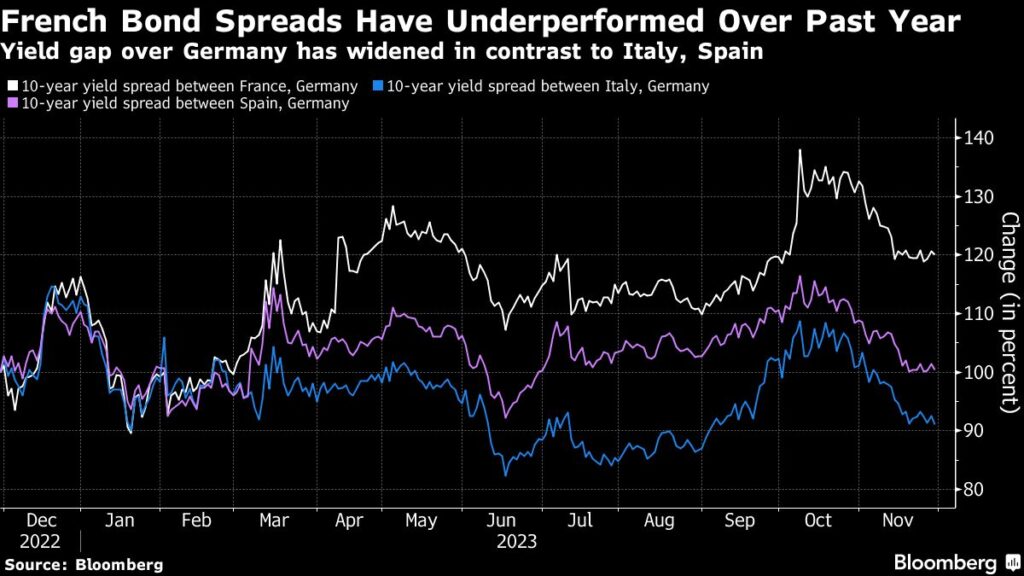(Bloomberg) — France’s credit rating was affirmed by S&P Global Ratings in a reprieve for President Emmanuel Macron as he seeks to cement his reputation for economic reform and fiscal proficiency.
Most Read from Bloomberg
S&P held its rating at AA/A-1+, saying it expects debt as a share of economic output will decline very gradually from 2025. The ratings firm maintained its negative outlook, first introduced a year ago, highlighting it could downgrade if it judges budget deficits won’t fall enough to cut the debt ratio, or if interest payments on the burden rise beyond 5% of government revenues.
“The negative outlook reflects our view of uncertainty relating to our forecast of France’s public finances amid its high, albeit slowly declining, budget deficits and elevated general government debt,” S&P said in a statement.
The unchanged rating is a relief for Macron, who has built his presidency around commitments to spur long-term growth prospects and end years of gaping budget deficits. The success of that approach has come under increased scrutiny after spending ballooned during the Covid pandemic and again in the energy crisis.
In April this year, Fitch Ratings downgraded France to AA-, and recent indicators of the performance of the euro area’s second-biggest economy show the near-term outlook is deteriorating.
Gross domestic product contracted unexpectedly in the third quarter, consumer spending dropped sharply in October, unemployment is rising, and the manufacturing sector is mired in a prolonged contraction.
S&P revised up its 2023 growth forecast to 0.9% from 0.4%, but cut its expectation for next year to 0.9% from 1.2% as predicts the economy will be hit by a weakness in Germany and tighter financial conditions.
The concern is that France’s debt pile — 20 percentage points higher than the bloc’s 90% average — exposes it to interest rates that have markedly risen. By its own reckoning, the Finance Ministry anticipates the cost of servicing those borrowings will nearly double to €74 billion ($81 billion) by 2027.
Investors have shown increased caution, sending the gap between the 10-year French yield and the German benchmark about 60 basis points wider over the past year. That contrasts with the equivalent Italian spread, which has narrowed. Spain’s spread over Germany has been stable over the period.
Finance Minister Bruno Le Maire said Friday that S&P’s decision to maintain the rating is “coherent” given the government’s policies on public finances.
“More than ever, we are determined to reduce public spending and accelerate France’s debt reduction,” Le Maire said in a statement. “Our independence and the respect for our national and European commitments are at stake.”
In September, France presented a first step toward tackling high debt with €16 billion ($17.4 billion) of savings to reduce its deficit to 4.4% of economic output in 2024 from 4.9% this year. But most of that will come from withdrawing vast support provided to households and firms during the energy crisis.
Those fiscal plans face closer scrutiny after the European Union said last month that France is at risk of breaching recommendations on spending growth next year. The country doesn’t plan to bring the deficit within the EU’s limit of 3% of economic output until 2027.
Ministers have pledged to intensify efforts to cut outlays in 2025. The government is also mulling a reboot of Macron’s trademark economic overhauls with plans to simplify the business environment and possible changes to unemployment benefits to encourage people into work.
–With assistance from Alice Gledhill and Alessandra Migliaccio.
Most Read from Bloomberg Businessweek
©2023 Bloomberg L.P.
Read the full article here

